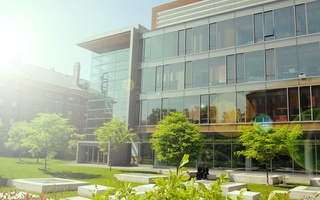UPDATED: September 30, 2014, at 1:00 a.m.
The Food Better campaign kicked off with a presentation at the Harvard Community Garden on Monday, one in a week-long series of events designed to improve student awareness on all issues related to food.
The partnership between Harvard University Dining Services, the Harvard Office for Sustainability, and the Harvard Food Law and Policy Clinic is part of a push by the broader Harvard community to increase and consolidate discussion on food and diet.
{shortcode-6adcc1c274c4e454e4cf58d8f00de4b4ee24bf96}
“Food is something that is personal, it’s something everybody can relate to, but there are a lot of issues around how food is produced and what happens to food once it’s used,” said Colin B. Durrant, manager of sustainability communications at the Office for Sustainability.
The main goal of Food Better is to facilitate conversations amongst students to help them better understand the issues and opportunities surrounding food literacy, from food sustainability and food systems to reducing food waste and improving diet.
“Folks have 100 things they want to talk about… Whatever area you’re interested in about food, just join in the conversation and help others connect to it as well,” said Crista Martin, director for marketing and communications at HUDS.
At the Harvard Community Garden on Monday, HUDS chefs and members of the community highlighted the fresh produce in HUDS's food preparation, as fresh herbs were harvested for the evening's salads.
Highlights for the rest of the week include the weekly Farmer’s Market on Tuesday in the Science Center Plaza, a beekeeping demonstration by the Harvard Undergraduate Beekeepers on Wednesday, and the Food Better symposium, which will take place on Friday in Boylston Hall. The symposium will feature a number of community partners and farmers, as well as health experts.
The Food Better campaign will continue after this week with the Deans’ Food System Challenge, which begins on Oct. 27. The event, hosted by the Harvard Innovation Lab, is open to interdisciplinary teams comprised of students from various schools across the University. Teams will be asked to find creative solutions to food system challenges all over the world.
“We have so much brain power and creative energy across the University that if we can harness that, and encourage students to come up with innovative ideas about the food system and about improving the food system, we can really make a major impact,” said Ona J. Balkus, a clinical fellow at the Harvard Food Law and Policy Clinic.
Students are also encouraged to contribute throughout the year by hosting their own Food Better events and activities.
“If you care about really any social justice issues, if you care about health and obesity, it all comes back to the food system, and I think making those connections for people is really important,” Balkus said.
Read more in University News
Turkish Billionaire Donates $24M for Public HealthRecommended Articles
-
Sustainability Projects Honored at Green Carpet AwardsHarvard community members who have made significant contributions to sustainability efforts on campus and beyond were honored at the third annual Green Carpet Awards in Sanders Theater Thursday afternoon.
-
 Green Is the Not-So-New Crimson
Green Is the Not-So-New Crimson -
'Harvard Thinks Green' Returns to SandersAbove the stage of a packed Sanders Theatre hung two green signs reading in bold letters, “Green is the new Crimson.”
-
University Outlines Green InitiativesThe University has substantially reduced greenhouse gas emissions, food waste, trash, water use, and the number of commuters who drive solo to campus, according to a University-wide Sustainability Impact Report released by the Office for Sustainability on Monday.
-
Students Launch Fund for Green ProjectsA student-run website launched last week will connect sustainability projects on Harvard’s campus to potential donors, paving the way for green improvements to University facilities, including LED lights in the Quad and a new dishwasher for Cabot Cafe.
-
Redefining SustainabilitySustainability has been a major challenge for us throughout modern history, encompassing the century-long concern of securing a sustainable energy source and the search for sustainable transportation.













